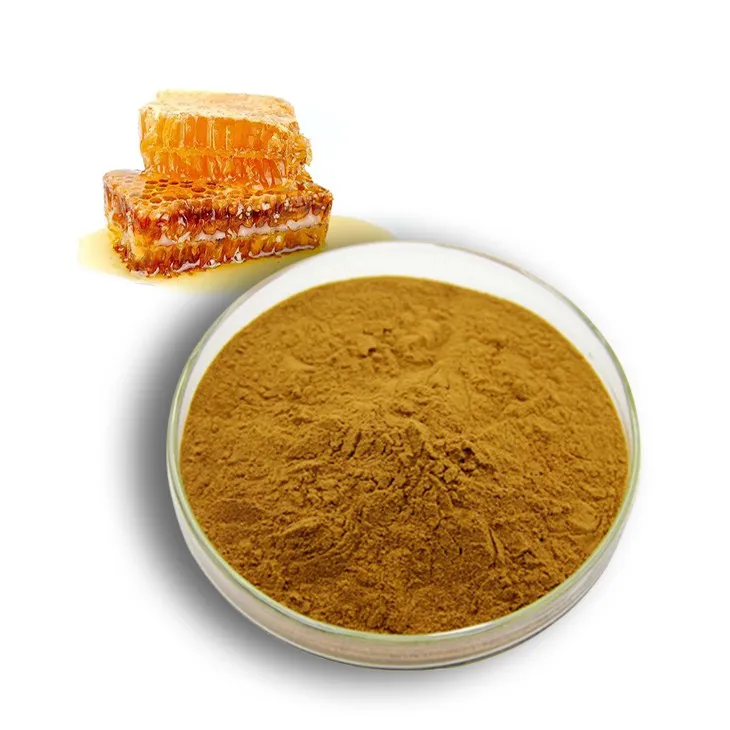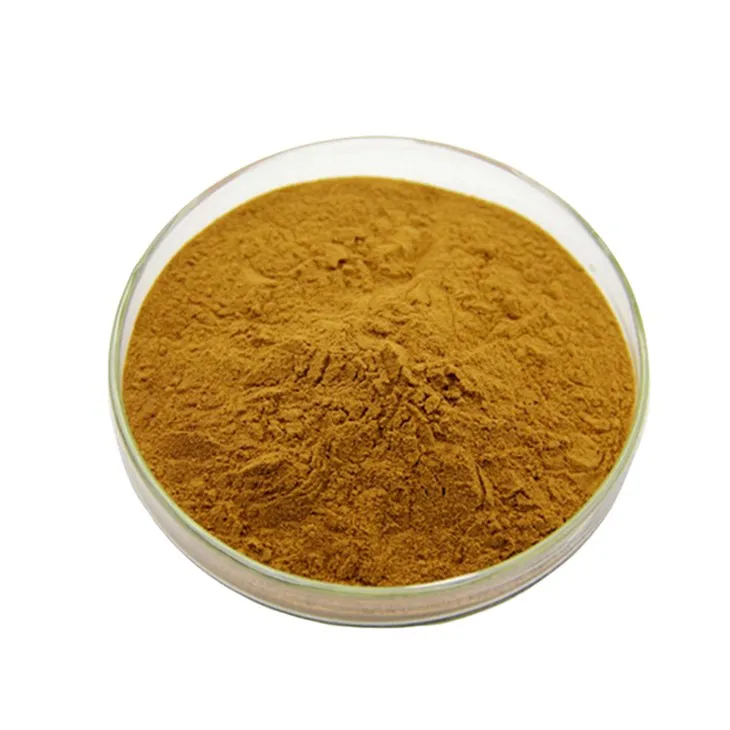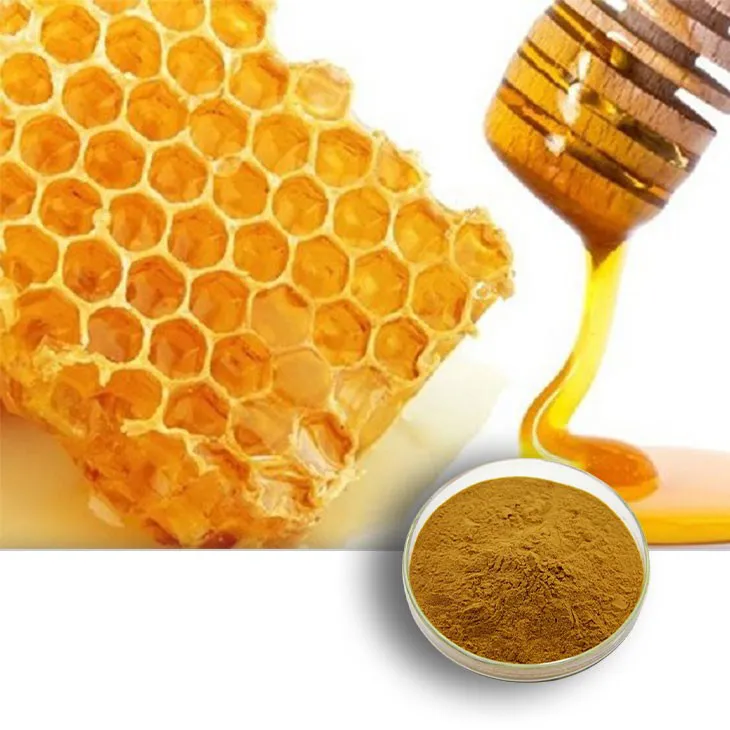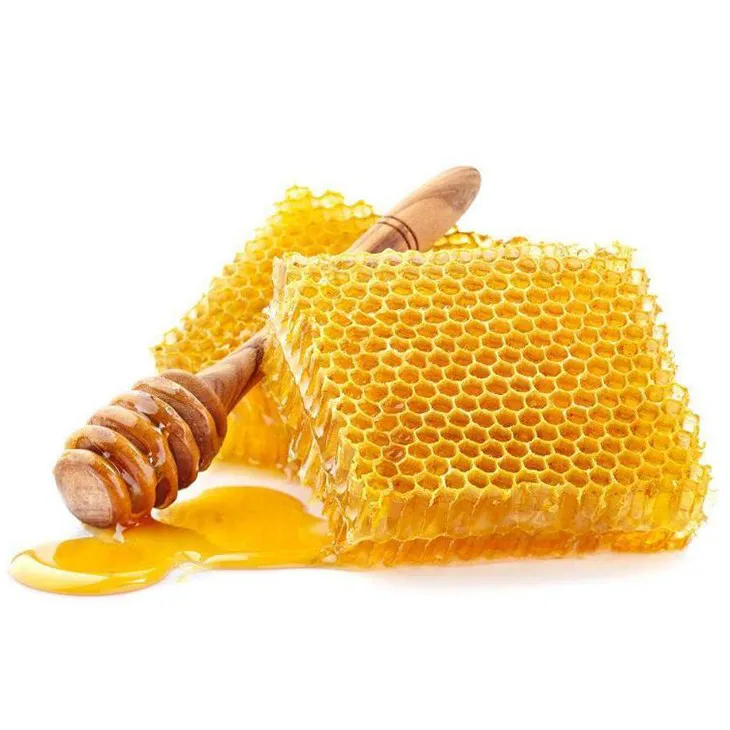- 0086-571-85302990
- sales@greenskybio.com
What is propolis extract powder and why is it used on the skin?
2024-11-12

1. Introduction to Propolis Extract Powder
Propolis Extract Powder is a remarkable natural product that has been gaining significant attention in various fields, especially in skincare. Propolis is a resinous substance that honeybees collect from tree buds, sap flows, or other botanical sources. Bees use propolis to seal small gaps in their hives, protecting the colony from external threats such as wind, rain, and invaders like bacteria and viruses. When this propolis is processed into an extract powder, it becomes a concentrated form that retains its numerous beneficial properties.
The extraction process of propolis into powder involves several steps. First, raw propolis is collected from beehives. Then, it is typically purified to remove impurities such as wax, dirt, and other debris. After purification, the propolis is subjected to extraction methods that isolate its active compounds. These methods can include solvent extraction or supercritical fluid extraction, among others. The resulting extract is then dried and powdered, making it easier to handle, store, and use in various applications.

2. Composition of Propolis Extract Powder
Propolis contains a rich and diverse array of over 300 different compounds. These can be broadly classified into several groups:
2.1. Flavonoids
Flavonoids are one of the major components in propolis extract powder. They are a large group of polyphenolic compounds known for their antioxidant properties. Flavonoids such as Quercetin, kaempferol, and apigenin play a crucial role in protecting the skin from oxidative stress. Oxidative stress is caused by an imbalance between the production of free radicals and the body's ability to neutralize them. Free radicals can damage skin cells, leading to premature aging, wrinkles, and other skin problems. The flavonoids in propolis extract powder can scavenge these free radicals, thus reducing oxidative damage to the skin.
2.2. Phenolic Acids
Phenolic acids are another important class of compounds in propolis. Caffeic acid, ferulic acid, and p - coumaric acid are some of the phenolic acids present. These acids contribute to the anti - inflammatory and antimicrobial properties of propolis extract powder. They can inhibit the growth of bacteria, fungi, and viruses on the skin, preventing infections and reducing skin inflammation.
2.3. Terpenes
Terpenes are volatile compounds that give propolis its characteristic aroma. They also possess various biological activities. Some terpenes in propolis have been shown to have anti - tumor and immunomodulatory effects. In the context of skin health, they may contribute to the overall enhancement of the skin's immune system, helping the skin to better defend itself against harmful agents.

3. Reasons for Using Propolis Extract Powder on the Skin
3.1. Enhancing Skin Immunity
The skin is the body's first line of defense against external threats. Propolis extract powder can play a significant role in strengthening this defense mechanism. It contains various bioactive compounds that stimulate the skin's immune cells, such as keratinocytes and Langerhans cells. These cells are responsible for recognizing and responding to foreign invaders like bacteria, viruses, and environmental pollutants.
When applied to the skin, propolis extract powder can activate the skin's innate immune response. For example, it can increase the production of antimicrobial peptides, which are small proteins that have the ability to kill or inhibit the growth of microorganisms. This helps to create a hostile environment for pathogens on the skin surface, reducing the risk of infections.
Moreover, propolis extract powder can also enhance the skin's adaptive immune response. It can modulate the activity of immune cells in a way that they can better remember previous encounters with pathogens and mount a more effective response upon subsequent exposures. This long - term strengthening of the skin's immune system can lead to healthier and more resilient skin.
3.2. Moisturizing the Skin
Proper skin hydration is essential for maintaining healthy - looking skin. Propolis extract powder has excellent moisturizing properties. It can form a protective barrier on the skin surface, which helps to prevent water loss from the skin.
The compounds in propolis extract powder can interact with the skin's natural moisture - retaining components, such as ceramides and lipids. This interaction helps to strengthen the skin's lipid barrier, which is crucial for keeping the skin hydrated. When the skin's lipid barrier is intact, it can effectively hold water, resulting in a plump, smooth, and supple appearance.
Furthermore, propolis extract powder can also attract and bind water molecules to the skin. This provides an additional source of hydration, especially in dry or dehydrated skin conditions. Regular use of propolis - based skincare products can improve the skin's overall moisture content and prevent dryness, flakiness, and cracking.
3.3. Anti - Inflammatory Qualities
Skin inflammation can be caused by various factors, including allergens, irritants, UV radiation, and microbial infections. Propolis extract powder has potent anti - inflammatory properties that can help to soothe and calm inflamed skin.
The phenolic acids and flavonoids in propolis extract powder can inhibit the production of inflammatory mediators in the skin. These mediators, such as cytokines and prostaglandins, are involved in the inflammatory response. By reducing their production, propolis extract powder can alleviate redness, swelling, and pain associated with skin inflammation.
For individuals with sensitive skin, propolis extract powder can be a valuable ingredient in their skincare routine. It can help to reduce the frequency and severity of skin flare - ups, providing relief from symptoms such as itching, burning, and irritation. Additionally, it can also be beneficial for those with skin conditions such as eczema and psoriasis, where inflammation plays a major role in the disease process.

4. Other Benefits of Propolis Extract Powder for Skin
In addition to the above - mentioned benefits, propolis extract powder offers several other advantages for the skin:
- Antioxidant Protection: As mentioned earlier, the flavonoids in propolis extract powder act as powerful antioxidants. They can neutralize free radicals not only from external sources such as UV radiation and pollution but also from internal sources like metabolic processes. This antioxidant protection helps to prevent damage to the skin's DNA, proteins, and lipids, which are all essential for maintaining healthy skin.
- Wound Healing: Propolis has been used for centuries for its wound - healing properties. When applied as an extract powder on the skin, it can accelerate the healing process of minor cuts, abrasions, and burns. It promotes cell proliferation and tissue regeneration, and also has antibacterial properties that prevent wound infections.
- Anti - Aging Effects: The combination of antioxidant, anti - inflammatory, and skin - immunity - enhancing properties of propolis extract powder makes it an excellent ingredient for anti - aging skincare. It can reduce the appearance of wrinkles, fine lines, and age spots by protecting the skin from oxidative stress, reducing inflammation, and promoting collagen synthesis. Collagen is a protein that provides structural support to the skin, and its degradation is associated with the aging process.

5. How to Use Propolis Extract Powder in Skincare
Propolis extract powder can be incorporated into various skincare products. Here are some common ways to use it:
- Masks: Propolis extract powder can be mixed with other ingredients such as clay, honey, or aloe vera to create a face mask. This type of mask can be applied to the face for 10 - 15 minutes and then rinsed off. It can help to deep - clean the pores, moisturize the skin, and provide antioxidant and anti - inflammatory benefits.
- Creams and Lotions: Many skincare brands include propolis extract powder in their creams and lotions. These products can be applied to the face and body as part of a daily skincare routine. They are especially beneficial for dry, sensitive, or aging skin, providing long - lasting hydration, protection, and anti - aging effects.
- Serums: Propolis - based serums are becoming increasingly popular. These serums are usually more concentrated than creams and lotions and can penetrate deeper into the skin. They can be applied after cleansing and toning the skin and before applying moisturizer. Serums containing propolis extract powder can target specific skin concerns such as fine lines, uneven skin tone, and dullness.
6. Precautions and Considerations
While propolis extract powder is generally safe for most people to use on their skin, there are a few precautions to keep in mind:
- Allergies: Some individuals may be allergic to propolis. Before using any propolis - based skincare product, it is advisable to do a patch test on a small area of skin, such as the inside of the forearm. Wait for 24 - 48 hours to see if there is any allergic reaction, such as redness, itching, or swelling.
- Purity and Quality: Ensure that the propolis extract powder used in skincare products is of high quality and purity. Low - quality or contaminated propolis may not provide the expected benefits and may even cause skin irritation.
- Interaction with Other Ingredients: If you are using other skincare products or medications, it is important to be aware of any potential interactions. For example, some active ingredients in other products may interact with the compounds in propolis extract powder, affecting their efficacy or causing unwanted side effects.
FAQ:
Question 1: How is propolis extract powder made?
Propolis extract powder is made by first collecting propolis from beehives. Bees create propolis from various plant resins, waxes, and their own secretions. Then, through a series of extraction processes such as solvent extraction or supercritical fluid extraction, the active components are separated from the raw propolis. Finally, the extracted liquid is dried to form a powder, thus obtaining propolis extract powder.
Question 2: Can propolis extract powder be used on all skin types?
Generally, propolis extract powder can be used on most skin types. However, some people with extremely sensitive skin may need to do a patch test first. Since it has anti - inflammatory and moisturizing properties, it is beneficial for dry, normal, and oily skin. For sensitive skin, if there is no adverse reaction after the patch test, it can also help soothe and protect the skin.
Question 3: Are there any side effects of using propolis extract powder on the skin?
Although propolis extract powder is generally safe for skin use, some people may experience allergic reactions. This is because propolis contains a variety of components, and some individuals may be sensitive to certain substances in it. Symptoms of an allergic reaction may include redness, itching, or swelling at the application site. If such symptoms occur, the use should be discontinued immediately.
Question 4: How often should propolis extract powder be used on the skin?
The frequency of using propolis extract powder on the skin depends on individual skin conditions. For normal skin maintenance, it can be used 2 - 3 times a week. For those with skin problems such as dryness or mild inflammation, it may be used more frequently, but generally not more than once a day. Over - use may cause skin irritation in some cases.
Question 5: Where can one buy high - quality propolis extract powder for skin use?
High - quality propolis extract powder for skin use can be purchased from several sources. One option is to buy from reliable health food stores or pharmacies. These places usually have products that meet certain quality standards. Another option is to purchase from well - known online retailers. However, when buying online, it is important to check customer reviews and the reputation of the brand. Also, some specialized skincare stores may also sell propolis extract powder products.
Related literature
- Propolis: A Wonder Beehive Product and Its Pharmacological Potentials"
- "The Use of Propolis in Cosmetics: Properties and Applications"
- "Beneficial Effects of Propolis on Skin Health: A Review"
- ▶ Hesperidin
- ▶ Citrus Bioflavonoids
- ▶ Plant Extract
- ▶ lycopene
- ▶ Diosmin
- ▶ Grape seed extract
- ▶ Sea buckthorn Juice Powder
- ▶ Fruit Juice Powder
- ▶ Hops Extract
- ▶ Artichoke Extract
- ▶ Mushroom extract
- ▶ Astaxanthin
- ▶ Green Tea Extract
- ▶ Curcumin
- ▶ Horse Chestnut Extract
- ▶ Other Product
- ▶ Boswellia Serrata Extract
- ▶ Resveratrol
- ▶ Marigold Extract
- ▶ Grape Leaf Extract
- ▶ New Product
- ▶ Aminolevulinic acid
- ▶ Cranberry Extract
- ▶ Red Yeast Rice
- ▶ Red Wine Extract
-
Aminolevulinic acid
2024-11-12
-
Moringa powder
2024-11-12
-
Almond Extract Powder
2024-11-12
-
Kelp Extract Powder
2024-11-12
-
Acerola Extract
2024-11-12
-
Camu Camu Extract
2024-11-12
-
Curcumin
2024-11-12
-
Agaricus Blazei Extract
2024-11-12
-
Scutellaria Extract
2024-11-12
-
Beetroot Powder
2024-11-12





















